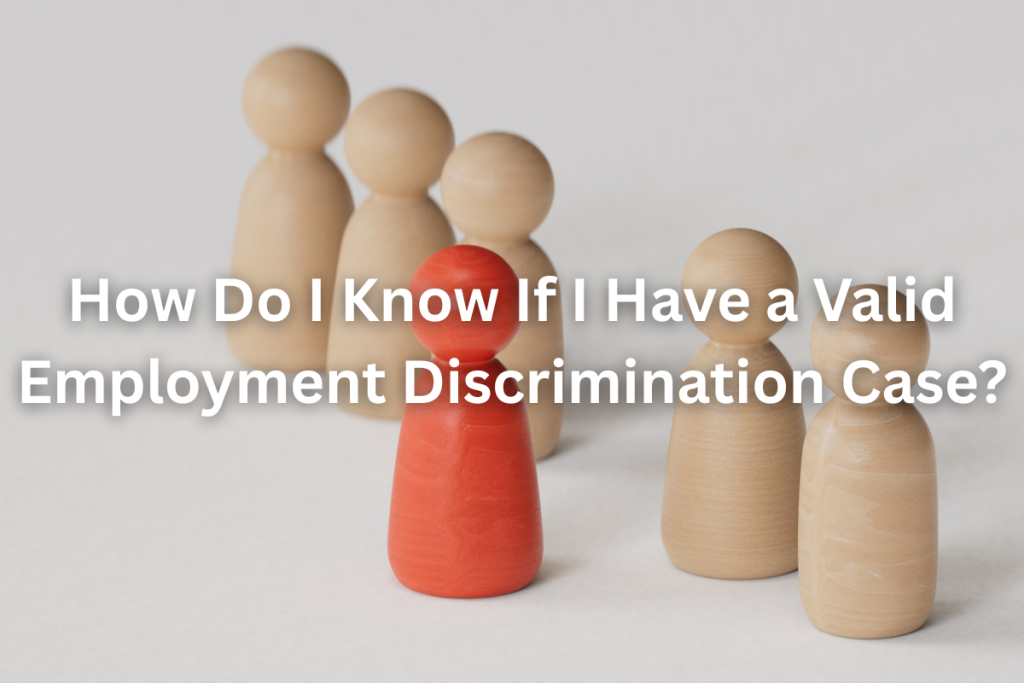Facing unfair treatment at work is stressful and confusing. Many employees ask themselves: Do I really have a legal case, or am I just experiencing bad management? The truth is, not every frustrating situation amounts to unlawful discrimination. To know whether you have a valid case, it’s important to understand what the law defines as employment discrimination and what evidence helps support your claim.

What Counts as Discrimination?
Employment discrimination occurs when an employer makes decisions or treats an employee unfairly based on a legally protected characteristic. Under California’s Fair Employment and Housing Act (FEHA) and federal law, protected categories include race or color, national origin or ancestry, religion or creed, sex, gender identity, sexual orientation, pregnancy or related medical conditions, age (40+), disability, medical condition, genetic information, marital status or family responsibilities, and military or veteran status. If your employer’s actions are tied directly to one of these traits, you may have a valid discrimination case.
Signs Your Case May Be Valid
Sometimes, it’s obvious when discrimination occurs, but in other cases it can be subtle. There isn’t always direct evidence of discrimination, but sometimes there is circumstantial evidence of illegal bias. Consider these scenarios:
- Hiring and promotions: you are denied a role despite your excellent qualifications, while someone outside your protected class with lesser qualifications is chosen. For example, a qualified woman is consistently passed over for promotions in favor of less qualified male coworkers.
- Unequal pay: you discover coworkers in the same role, with the same responsibilities, are being paid more.
- Termination or demotion: you’re fired or demoted shortly after disclosing a pregnancy, medical condition, or filing a workplace complaint.
- Hostile environment: you’re subjected to ongoing offensive comments about your race, sex, or disability. Even if your job title and pay remain the same, a hostile work environment can still cause damages.
Gathering Evidence
Employment discrimination cases rely heavily on documentation. Examples include emails or texts that provide written proof of discriminatory remarks, performance reviews that suddenly decline after disclosure of pregnancy or complaints, pay records showing disparities between employees performing substantially equal work, and witness accounts from coworkers who observed unfair treatment. It’s important to keep detailed notes, save relevant documents, and preserve communications that may help support your case. Courts and agencies like the EEOC and California Civil Rights Department (CRD) rely on evidence, not just suspicions, to decide claims.
Hostile Work Environment vs. Adverse Actions
You don’t have to be fired to have a valid claim. Harassment, “jokes,” and ongoing hostility based on protected traits may qualify if they are severe or pervasive enough to interfere with your ability to do your job. For instance, repeated derogatory jokes about women, age-related comments suggesting you “don’t keep up,” or mocking an employee’s medical condition can all create a hostile environment. Similarly, retaliation for reporting issues—even if you keep your job—is illegal. If your employer demotes you, excludes you from meetings, or suddenly begins disciplining you after you file a complaint, these actions may form the basis for a retaliation claim. The American Psychological Association offers helpful guidance on recognizing workplace harassment and protecting your mental health in challenging or hostile work environments.
Examples of What Does Not Qualify
Not every negative workplace experience counts as discrimination. Examples of non-discriminatory but still frustrating workplace situations include a manager who is rude or disorganized but treats all employees poorly, decisions based on legitimate performance issues like repeated tardiness or missed deadlines, and personality conflicts between coworkers that are not tied to protected categories.
Determining If Your Experience Meets the Legal Standard
Because discrimination cases depend on specific facts and legal definitions, consulting a lawyer early can help you avoid missteps. An attorney can evaluate whether your experience meets the legal standard for discrimination, advise you on whether to report internally or file a formal agency complaint, help you preserve important evidence, and try to protect you against retaliation while you pursue your rights. At Lawless, Lawless & McGrath, we review your situation, explain your rights, and guide you on next steps. We’ve helped San Francisco employees for decades determine whether they have valid claims, and pursue them successfully. If you’re unsure whether your experience is discrimination, speaking with a knowledgeable employment lawyer can provide clarity and peace of mind.
